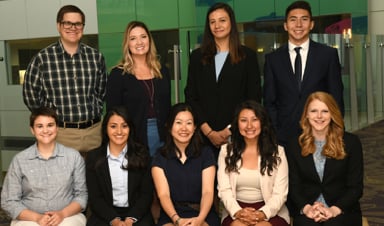Undergraduates are rarely exposed to a mentored research experience where they interact with patients. Yet that is exactly what a group of students enjoy each summer in a select program rich in opportunity.
PURPLE — Pediatric Psychiatry Undergraduate Research Program and Learning Experience — is shaded in several unique qualities. It is the only program at the CU Anschutz Medical Campus that provides: 1) clinical research mentorship, 2) to undergraduate students and 3) with a focus on pediatric mental health.
The program typically receives an average of 50 to 60 student applicants with a 10 percent acceptance rate. Students who are accepted into the cohort are paired with faculty to work on a range of real-life clinical research projects. This year’s group of six students were immersed in projects looking at topics in pediatric psychiatry and psychology such as:
- Dental care for patients with autism;
- Eating disorders;
- Pregnancy-related depression;
- Family’s influence on pediatric obesity.
Diverse cohorts
 2018 PURPLE cohort: top row (from left): Robert Evans (coordinator), Emmaly Perks (co-director), Kristen Torres and Austin Chavez. Bottom row (from left): Haley Dellinger, Maria Torres-Dominguez, Merlin Ariefdjohan (co-director), Eve Delao and Brianna Barkocy.
2018 PURPLE cohort: top row (from left): Robert Evans (coordinator), Emmaly Perks (co-director), Kristen Torres and Austin Chavez. Bottom row (from left): Haley Dellinger, Maria Torres-Dominguez, Merlin Ariefdjohan (co-director), Eve Delao and Brianna Barkocy.
The applicants represent universities nationwide and have a diverse background (e.g., first-generation college students, underrepresented ethnic minorities, DACA recipients and others).
“Within a span of 12 weeks, we also provide in-class sessions on scientific communication, professional development (writing resumes and cover letters, interviewing, etc.) and sessions on clinical observation,” said Merlin Ariefdjohan, PhD, MPH, one of the co-directors of PURPLE and assistant professor, Department of Psychiatry, School of Medicine (SOM). “On the research side, it’s a clinical experience where the students are supervised and mentored to collect data from patients and databases, rather than conducting experiments in a laboratory setting.”
Emmaly Perks, MA, co-director of PURPLE and Innovations Center Research Education and Training Manager in the psychiatry department, said it’s “pretty unheard of” for undergraduates to get this kind of contact with patients and their families along with mentoring and professional development. An undergraduate research project typically means working through experiments in a basic science-oriented lab with informal guidance from faculty.
Multifaceted experience
In PURPLE, “students are getting a multifaceted look at pediatric mental health so they can make a more informed decision of the kind of career they would like to pursue after graduation,” Perks said.
The program takes place at Children’s Hospital Colorado, but is housed within the Department of Psychiatry in the SOM. The students get access to the CU Anschutz Health Sciences Library as well as opportunities to shadow their mentors on rounds at Children’s. “All of our faculty are clinicians in an academic medical setting. They see patients but do research on the side,” said Ariefdjohan, who is also director of the Pediatric Mental Health Institute’s (PMHI) Innovations Center within the Child and Adolescent Division of the psychiatry department.
Thanks to donors, students also receive a bit of green — a stipend — during PURPLE, which hosted its third cohort this summer. Organizers cobble together funding sources, including donations from the Colorado Clinical & Translational Sciences Institute, private donors and the chair of the PMHI, and are hopeful to establish a more sustainable funding system. Such a scenario would allow PURPLE to offer more student positions each summer, especially to students who come from disadvantaged backgrounds and who might not otherwise be able to afford attendance in the program.
Building a pipeline
“Every year we get a lot more deserving applicants than spaces, so funding has always been a bit of limiting factor for us,” Ariefdjohan said.
Efficiencies are part of PURPLE, starting with the faculty and staff who donate their time to the program. They get rewarded, though, when they see students’ eyes light up from new discoveries. This year, two-thirds of the cohort will continue to contribute to CU, staying on campus into the school year with jobs as research interns. “We want this to be a pipeline,” Perks said. “We hope they’ll come into our department eventually as psychiatrists, psychologists, research assistants or others who care for children's mental health.”
Added Ariefdjohan, “The ultimate goal of this program is to inspire and build skills in students who wouldn’t have the means to do this otherwise. If we can somehow enable that, we find that to be the true reward of what we do.”
[cucalloutbox align="full" color="" class="" size=""]
PURPLE comments
Alexandra Malek (student, 2016 cohort): "This was an invaluable experience for me as it provided a safe and supportive environment for me to develop my skills as a researcher, scientist and young professional in the healthcare field."
Ayelet Talmi, PhD (faculty mentor, 2016-18): "Even more remarkable was the camaraderie and community the PURPLE program created among students, faculty mentors and past participants. You are truly creating a pipeline to engage students in possible careers in pediatric mental health and provide them with an opportunity to contribute their perspectives to the field early in their professional development."
Kristen Torres (student, 2018 cohort): "PURPLE was really great and gave me a lot of real-world and hands-on experience that you don't normally get in a classroom. It was so eye opening to work with patients and their families and it reaffirmed my decision to pursue a career in pediatric psychology. The experiences also led me to be more confident in my qualifications when applying for graduate school."
[/cucalloutbox]




